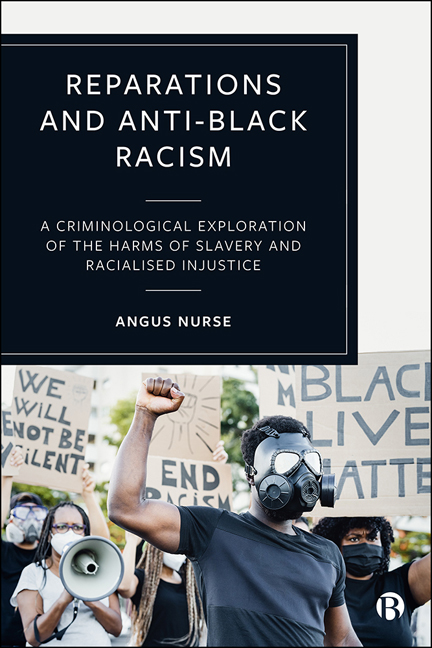 Reparations and Anti-Black Racism
Reparations and Anti-Black Racism Book contents
- Frontmatter
- Contents
- List of Abbreviations
- Acknowledgements
- Preface
- 1 Black Lives Matter: The Legacy of Slavery
- 2 Slavery and Reparations: A Criminological View
- 3 Reparations Litigation: An Overview
- 4 Victims of Slavery and Reparations: Who Suffers?
- 5 A Comparative Analysis of Reparations
- 6 Unjust Enrichment and the Socio-Legal Case for Reparations
- 7 The ‘Value’ of Reparations
- 8 The Nature of Reparations
- 9 Reparations in the 21st Century: Contemporary Debates and Issues on Reparations
- Appendix: Reparations Litigation and Settlements
- Notes
- References
- Index
2 - Slavery and Reparations: A Criminological View
Published online by Cambridge University Press: 13 May 2022
- Frontmatter
- Contents
- List of Abbreviations
- Acknowledgements
- Preface
- 1 Black Lives Matter: The Legacy of Slavery
- 2 Slavery and Reparations: A Criminological View
- 3 Reparations Litigation: An Overview
- 4 Victims of Slavery and Reparations: Who Suffers?
- 5 A Comparative Analysis of Reparations
- 6 Unjust Enrichment and the Socio-Legal Case for Reparations
- 7 The ‘Value’ of Reparations
- 8 The Nature of Reparations
- 9 Reparations in the 21st Century: Contemporary Debates and Issues on Reparations
- Appendix: Reparations Litigation and Settlements
- Notes
- References
- Index
Summary
Chapter 1 sets out the starting point for this book's discussion of anti-Black reparations discourse as having its basis in the harms caused by slavery, while acknowledging the contemporary reality of continued racism that is directed at and impacts negatively on Black citizens. This chapter situates the book's discussion of slavery reparations within criminological discourse, viewing slavery as both a crime of the powerful and as state crime (and state-corporate crime) given the (historical) legality of slavery in both the US and UK and its value to Western prosperity (Wilkins, 2020). As Chapter 1 identifies, slavery was underpinned by the state who in both the US and UK received revenues and taxes from slave labour and were thus complicit in the subjugation of African citizens who became property within the confines of the slave system. Whereas today most states have anti-trafficking laws (and international conventions also exist in this area), at the height of the transatlantic slave trade, the movement and trafficking of persons was deemed legal, profitable and supported the fledgling American economy. Thus, it was supported by state institutions, finance and other corporations and provided an economic contribution to states and private wealth (Neuborne, 2003). Thus, states were arguably complicit in slavery's human rights abuses for economic reasons as well as for cultural reasons predicated on beliefs that Black non-Europeans were lesser beings for whom slavery and a status as property was considered acceptable. This ideology rejected any notion of Black people as fellow citizens deserving of respect and equal treatment (Epps, 2006).
Criminological examination of how perpetrators and authorities consider mass atrocities such as genocide identifies some of the barriers to providing redress for such CAH. This chapter examines the political and philosophical aspects of reparations as linked to human rights conceptions and outlines the contemporary reparations movement as situated within state-crime discourse concerning repairing harm and approaching reparations through several different tracks: political, legal and social mechanisms.
Slavery as state crime and state-corporate crime
Mullins (2020: np) identifies the concept of state crime as being concerned with ‘the attempt to push the boundaries of both academic and political discourses to provide a recognition of the most harmful actions as states as criminal in nature and to bring social scientific theories of crime and criminality to bear in the identification, analysis, and control of these events’.
- Type
- Chapter
- Information
- Reparations and Anti-Black RacismA Criminological Exploration of the Harms of Slavery and Racialised Injustice, pp. 16 - 29Publisher: Bristol University PressPrint publication year: 2021


